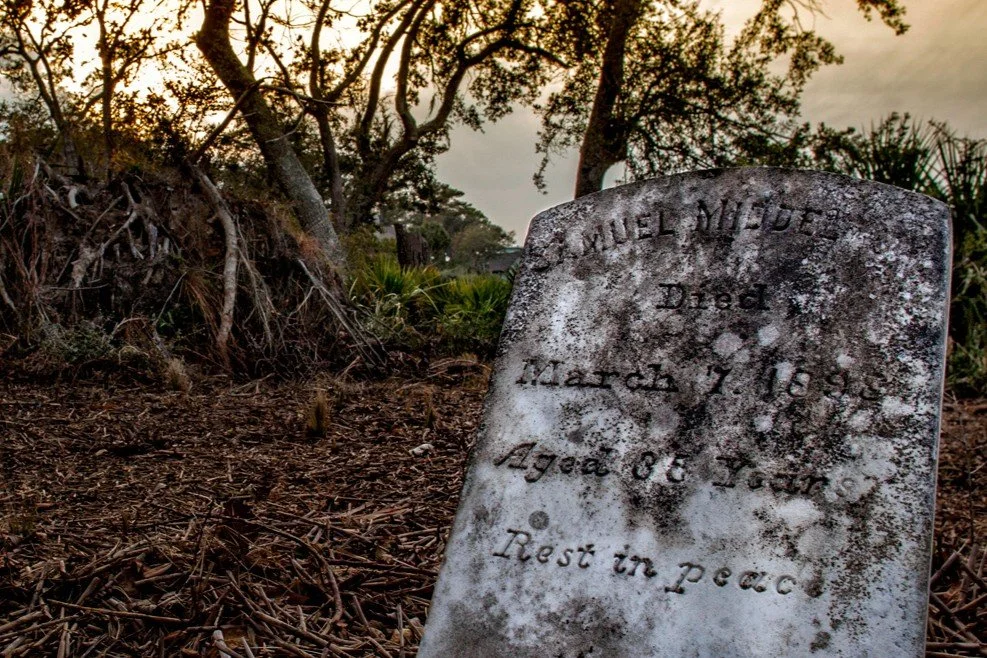Among the historic African American cemeteries on Hilton Head Island, Amelia Cemetery contributes to the tapestry of Gullah heritage.
Read MoreLocated in Sea Pines, this cemetery dates back to the Civil War era and was originally a Gullah burial ground. It features unique burial customs, including the placement of personal items on graves, reflecting West African traditions.
Read MoreSituated near Shelter Cove Plaza, this cemetery is a reminder of the island's plantation history and the African American communities that lived and worked there. It includes graves of individuals who were part of the Gullah community.
Read MoreLocated on the Hilton Head Plantation, this cemetery dates back to the Civil War era and was originally a Gullah burial ground. It features unique burial customs, including the placement of personal items on graves, reflecting West African traditions.
Read MoreAmong the historic African American cemeteries on Hilton Head Island, Amelia Cemetery contributes to the tapestry of Gullah heritage.
Read MoreOnce part of the Lawton Plantation, this cemetery includes the grave of Thomas Frazier, a member of the 21st U.S. Colored Infantry during the Civil War. It serves as a testament to the African American military service during that period.
Read MoreAlso known as Otter Hole Cemetery, it is part of the network of Gullah cemeteries and reflects the enduring legacy of African American families on the island.
Read MoreLocated beside Shelter Cove Shopping Center, this cemetery is among the nine historic Gullah cemeteries on the island. It reflects the enduring legacy of African American families in the area.
Read MoreThis 19th- and 20th-century African American cemetery, located on the outskirts of the island, overlooks Calibogue Sound and is maintained by family members. It reflects the Gullah community's presence and history in the area.
Read MoreEstablished in the early 1800s, Talbird Cemetery is one of Hilton Head's largest African American burial grounds, associated with Mt. Calvary Missionary Baptist Church. It reflects the deep-rooted Gullah Geechee heritage and traditions.
Read MoreOriginally known as the Government Cemetery, Union Cemetery served as the burial ground for soldiers who died during the Civil War on Hilton Head Island. Their graves were subsequently moved to the National Cemetery in Beaufort.
Read MoreZion Chapel of Ease Cemetery, dating back to 1767, includes the Baynard Mausoleum, believed to be the oldest surviving structure on Hilton Head Island. It reflects the island's colonial and antebellum history.
Read MoreFrom the oyster beds to the bateaux, from shrimp boats to the sentinel heron, Hilton Head Island’s waterways have shaped and sustained the Gullah way of life for generations. This post traces the intertwined stories of foodways, craftsmanship, and conservation—showing how oysters built communities, bateaux linked them, shrimp boats sustained them, and herons still guard them. Together these elements reveal a living culture of resilience, stewardship, and deep connection to the marsh. Dive in to experience the Gullah legacy that continues to define Hilton Head today.
Read MoreIn April 1970, a group of Black Hilton Head Island fishermen and members of the resort development community sailed to Washington, D.C., to deliver a petition with 45,000 signatures protesting the construction of a petrochemical plant on Victoria Bluff, near the Island. That trip was the culmination of a long and valiant fight to preserve the area’s natural environment that included environmentalists, developers, concerned citizens and the members of the Hilton Head Fishing Cooperative. Their courageous efforts successfully preserved the area’s natural environment and resources, which significantly contributed to the survival of the Lowcountry’s shrimping industry.
Read MoreThe Cherry Hill School, built circa 1937, is significant as a building associated with the development of African American education during segregation in South Carolina. The school operated until all African-American children attended the new consolidated elementary school in 1954. The community that organized, purchased the property, built, helped maintain, and attended the school was comprised of the descendants of the Town of Mitchelville, the first community to mandate public education in America. At the time of the construction of the Cherry Hill School, the island was still an isolated, largely undeveloped, unincorporated portion of Beaufort County.
Read More











